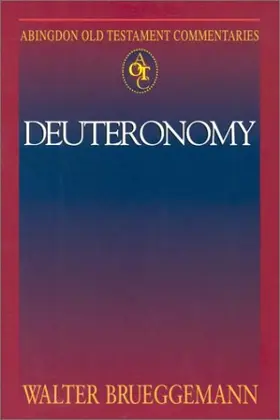

Deuteronomy
in Abingdon Old Testament Commentaries
Pages
306 pages
Publisher
Abingdon Press
Published
10/1/2001
ISBN-13
9780687084715
In this volume on Deuteronomy, Brueggemann shows the significance of the Book of Deuteronomy to the shape and substance of Israel's faith in the Old Testament. Deuteronomy gave classic articulation to the main themes characteristic of Judaism, and, derivatively, of Christianity. Brueggemann emphasizes that Deuteronomy is an expression of covenant theology, whereby YHWH and Israel are pledged to exclusive loyalty and fidelity to each other; YHWH is to assure the well-being of Israel, and Israel is to live in trust and obedience to YHWH. In examining the relationship of Israel to God, Brueggemann makes suggestions on how such covenant fidelity might be lived out by believers today.
Reviews
Remembering the words of Qoheleth, �of making many books there is no end, and much study is a weariness of the flesh� (Eccl 12:12), one may wonder, Why another commentary on the book of Deuteronomy? In the present volume, Brueggemann answers this skepticism by appealing to the very nature of Deuteronomy: what the book says about Israel�s faith and how it says it. For him the main themes of the book�such as law and obedience, promise and faithfulness, covenant and exclusive loyalty, a jealous and merciful God, right worship and radical social ethic�prov ide an essential foundation for the formation of Jewish and Christian faith. Accordingly, he opens his commentary with an assertion (17), similar to E. Achtemeier�s claim about Deuteronomy, that �there is no other book of more impo rtance in the Old Testament and no Old Testament book more basic for understanding the New Testament than Deuteronomy� ( Deuteronomy, Jeremiah [Philadelphia: Fortress, 1978], 9). In addition, Brueggemann argues that the book shows a dynamic process of interpreting the present reality, in view of the past, for the sake of the future. This interpretive process is expressed in its literary peculiarities, which include Moses� speech, temporal notations (�today� or �this day�), comman ds to remember the past, and anticipations of the next generations� questions.
[Full Review]
In the words of the general editor of the Abingdon Old Testament Commentaries(AOTC), Walter Brueggemann’s serial commentary on Deuteronomy is intended for “theuse of theological students and pastors. It is hoped that they may be of service also toupper-level college or university students and to those responsible for teaching incongregational settings” (9). What the book is not is a line-by-line immersion into thegrammar, syntax, and philology that characterize other commentaries. Rather, the intentof the AOTC series is to present the reader with an assessment of the document and textthat reflects in some way on the present day and age. This can be a very difficult task, onethat Brueggemann handles in his own imaginative and thought-provoking way. Byfocusing on the theological and ethical dimensions of the text, Brueggemann routinelyuses the Deuteronomic narrative as a commentary on our present day and age, set withina Judeo/Christian context (e.g., 47, 89–91). This hermeneutic, that is, allowing the OldTestament text to speak to Christians in their contemporary setting, is remarkable and isaccomplished by Brueggemann with his typical force and lucidity (e.g., 46–50, 154–56).The book is structured unlike other commentaries in that it follows theological breaks inthe narrative rather than a chapter-by-chapter demarcation.
[Full Review]

